Office politics and insane workplace stories that make you question your own reality are a given when you are enduring the 9-to-5 rat race, and NBC’s The Office certainly didn’t hold back when they chose to satirize America’s corporate culture. This not only made the series resonate with fans, but made it a major hit across nine seasons. Not every episode did it in the right way though. From painfully awkward racial insensitivity to outright problematic plotlines, The Office walked the tightrope between close-to-the-bone reality comedy and flat-out controversy.
Videos by ComicBook.com
While many fans still defend the show’s humor as a true setup for Michael Scott’s naivety, others have pointed out that certain storylines caused debate even when they first aired, as well as aging poorly when held up to modern audience scrutiny. Here are 10 of the most controversial episodes of The Office, which could have won their own set of cringe-worthy Dundies.
1) “Diversity Day” (Season 1, Episode 2)
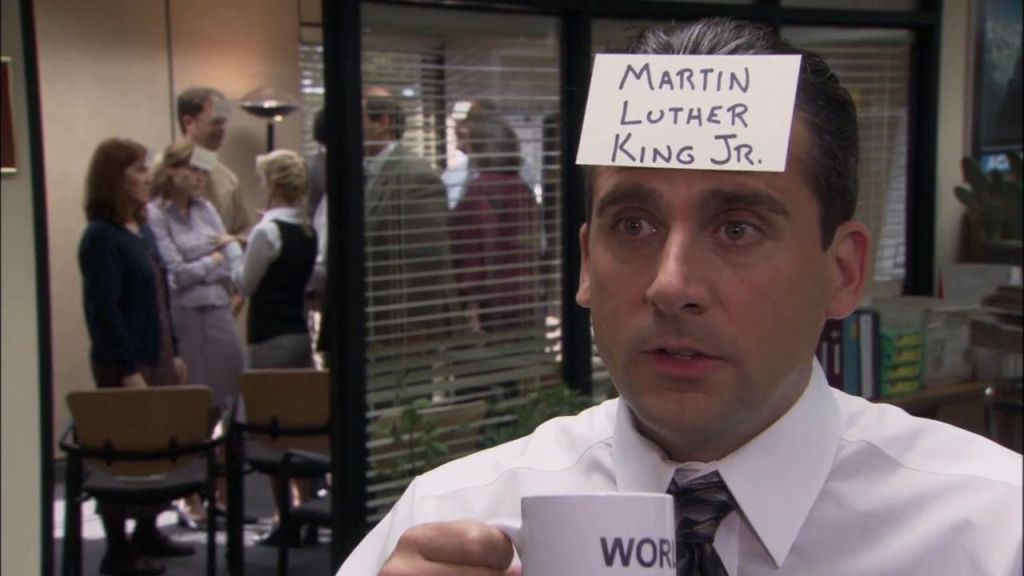
It’s no surprise we’re starting with what can be described as the poster child for problematic The Office episodes. In “Diversity Day,” Michael Scott decides to host his own cultural sensitivity seminar after the company’s actual trainer reprimands him for an offensive Chris Rock impersonation. The result is a mock exercise where employees wear notecards with different ethnicities written on them, forcing them to ‘interact’ with one another which basically boils them down to their stereotypes.
Critics have noted that the episode is very much an uncomfortable watch, despite it being created as a satirical look at clueless managers trying to impress people. And although many fans do see it that way, stating that it highlights Michael’s ignorance to mock racism, others contend it only perpetuates harmful tropes.
It became so controversial, in fact, that back in 2021 it was seemingly pulled from the Comedy Central show marathon.
2) “Health Care” (Season 1, Episode 3)

Straight off the back of “Diversity Day,” we power head-first into the uncomfortable “Health Care” episode. It’s only the third episode of Season 1, and we’ve already got a good 60 minutes of cringe-time between the two. Michael Scott dodges responsibility by tasking Dwight with choosing a new, cost-cutting healthcare plan. What follows is classic Schrute mismanagement and a complete lack of boundaries.
Dwight proceeds to cut nearly every meaningful medical benefit while demanding detailed disclosures of his coworkers’ private health conditions. Though Jim and Pam’s retaliatory list of fake diseases is a fan favorite (“hot dog fingers,” anyone?), it actually exacerbates the whole issue and leads to Dwight setting up a very public team meeting to identify the real medical conditions vs the fake ones.
While the episode still delivers laughs, its depiction of management exploiting employee benefits for profit feels particularly grim in a post-pandemic world. Not only that but with Jim and Pam also diminishing the seriousness of losing these benefits now feels ableist.
3) “Sexual Harassment” (Season 2, Episode 2)
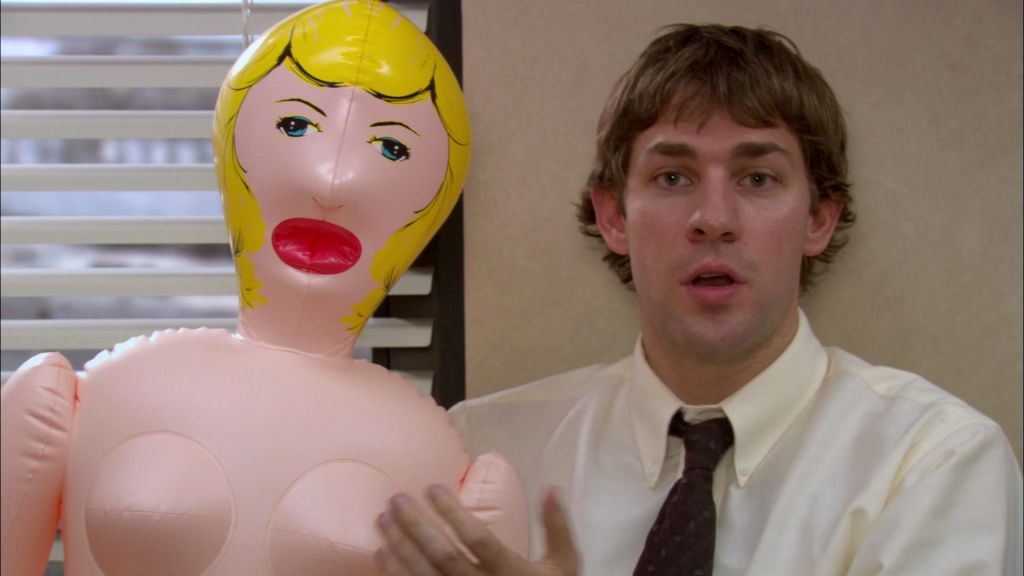
This episode is just a classic case of “I don’t agree so everyone else is wrong.” When corporate cracks down on inappropriate workplace behavior, Michael rails against what he sees as “PC culture” and clings to — even doubling down on — his inappropriate jokes. This is in part because so-called “alpha male” Todd Packer is back in town, and Michael is showing off to impress him. In doing so, Michael lets Packer’s offensive one-liners play out, and causes a deeply uncomfortable scene with Phyllis being objectified.
Though it attempts to call out sexist behavior, the humor often comes at the expense of the victims rather than the offenders. While The Office fans have long pointed to this episode as emblematic of its edgy tone, now it just feels like a tired trope that missed the satire mark, even then.
4) “Boys and Girls” (Season 2, Episode 15)
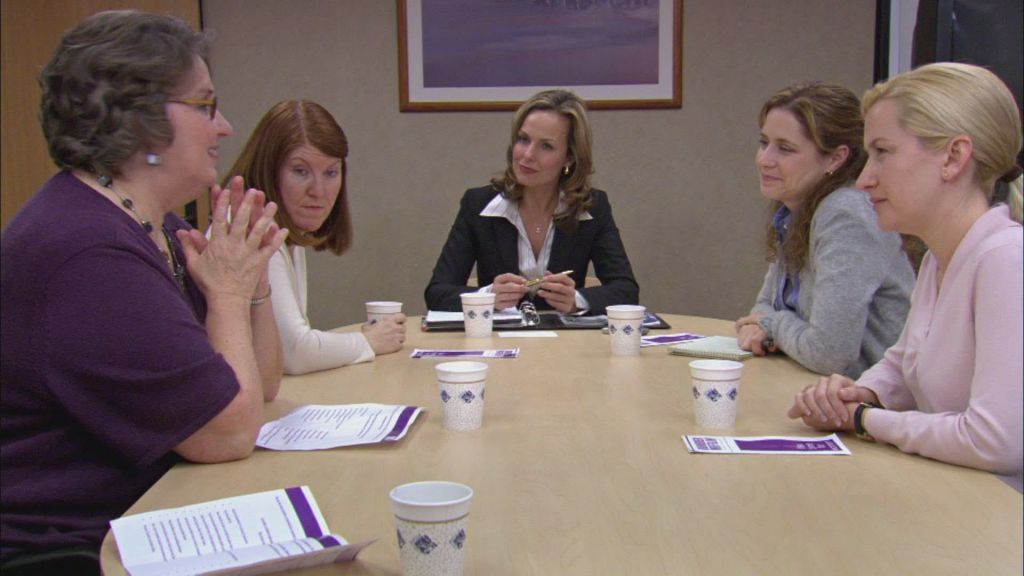
Gender politics take center stage in this episode, and the outcome is difficult to watch. When Jan hosts a “Women in the Workplace” seminar, Michael is suffering from what can only be described as a huge case of FOMO. Despite his attempts to join the meeting, Jan refuses to let him stay. In a thoroughly Michael Scott way, he responds by leading an impromptu “men’s rights” meeting in the warehouse. What begins as a satirical take on office sexism soon devolves into dangerous stereotypes, union-busting, and undercutting female ambition. The entire plot of women in the workplace crumbles into focusing on the mens’ antics, ironically.
Pam’s subplot also includes her discussing attending art school with Roy, who promptly dismisses it. This sparked a lot of criticism from fans who saw it as reinforcing toxic relationship norms, which seemed to be all Pam and Roy were from Season 1 to Season 3.
5) “Gay Witch Hunt” (Season 3, Episode 1)
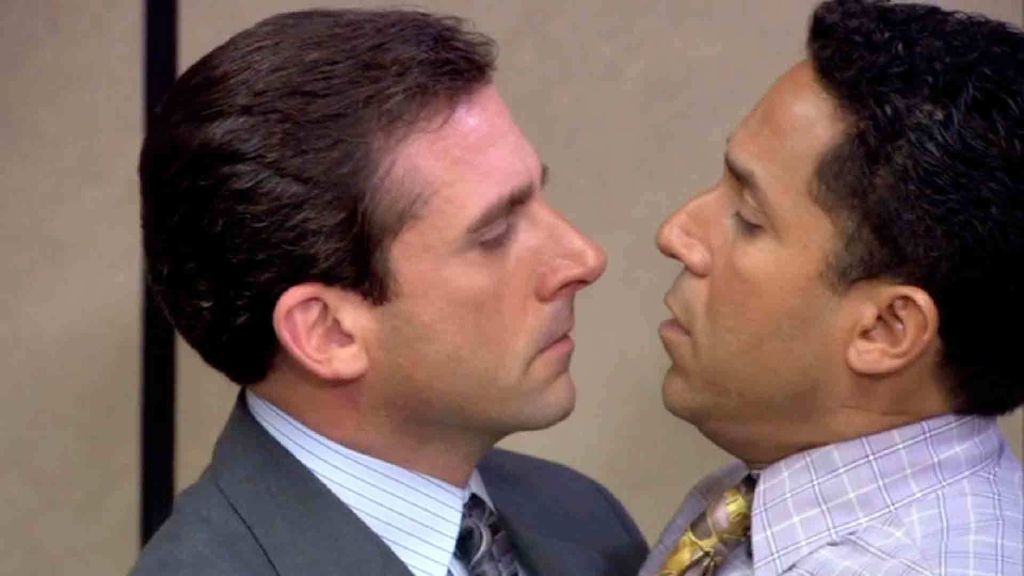
Michael’s misguided effort at embracing different lifestyles strikes again. When Michael finds out Oscar is gay, he inadvertently outs him to the entire office. What ensues is his attempts to “prove” he’s not homophobic. This culminates in Michael forcing a painfully awkward kiss on Oscar — without Oscar’s consent — in front of the entire office. While Steve Carell and Oscar Nuñez improvised the kiss, the broader implications of the moment have aged poorly.
This episode has been ranked by many as one of the most controversial plotlines in The Office, noting that the show leaned on shock value rather than nuanced representation. The episode tries to sign off with a feel-good bow, but many now see it as a clumsy and invasive handling of LGBTQ+ identity.
6) “The Convict” (Season 3, Episode 9)
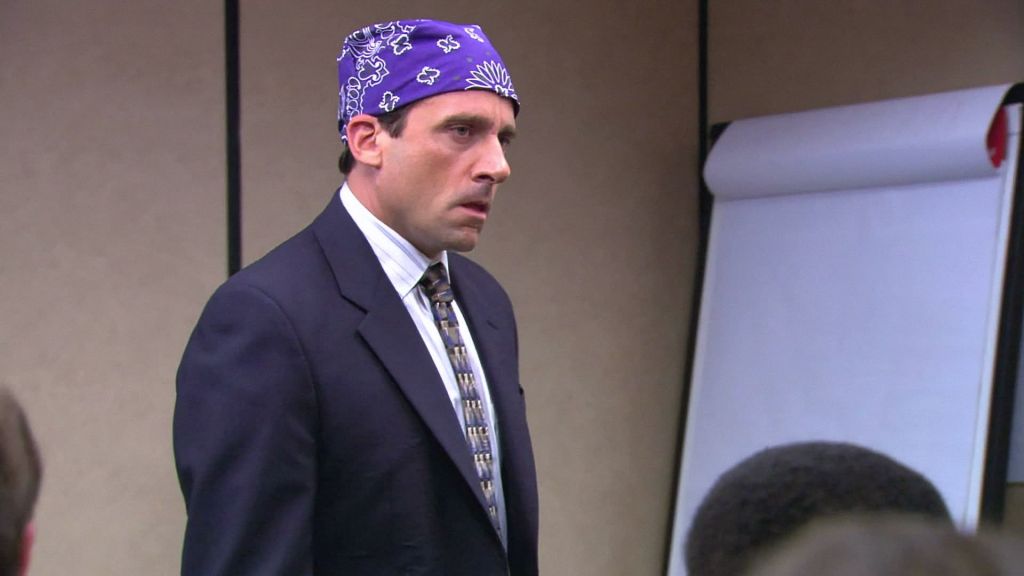
Co-written by OG creators Ricky Gervais and Stephen Merchant, this episode brings prison jokes front and center when the Scranton branch learns one of their new coworkers, Martin, is a former convicted criminal. Of course, the inappropriate questions begin, and Michael introduces the world to his “Prison Mike” persona. A highly stereotyped, poorly researched prison caricature, who had to eat gruel and face his prison Dementors every day.
Not only that, but Martin then has to disclose what his crime was (insider trading), and he gives a much nicer description of his prison time. This leads to the entire office wishing they could be in prison instead, and Michael locks them in the conference room for it. Though meant as satire, the episode trivializes the real-life challenges of re-entering society after incarceration.
7) “Women’s Appreciation” (Season 3, Episode 22)

The Office often used Michael Scott’s childish ignorance as a launchpad for comedy, but in “Women’s Appreciation,” the disconnect between satire and sincerity becomes almost impossible to ignore. After Phyllis experiences a very upsetting incident with a flasher in the parking lot, Michael finds it hilarious. He proceeds to do flasher impressions like a 12-year-old, and only stops when he realizes no one is finding him funny.
In a major 180, Michael hijacks the entire situation to be seen as an ally to the women of the office. He first suggests the solution is to simply appreciate women more — then proceeds to take them to a mall, where he asks intrusive questions about bras, talks over their feelings, and offers to buy them all lingerie from Victoria’s Secret.
Yet again, it is another episode that has started with quite a serious topic about gender inequality and turned the focus into “The Michael Scott Show,” making the women background players in what should have been their own storyline.
8) “Weight Loss” Parts 1 & 2 (Season 5, Episodes 1 & 2)
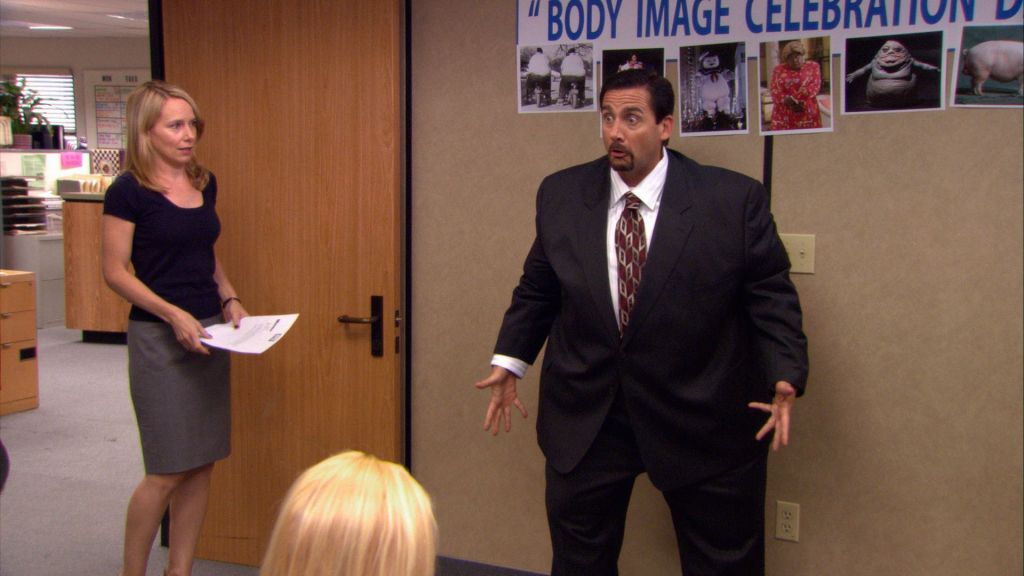
“I have a tapeworm. From Creed. That’s not a joke.”
The Office returned from summer break with a two-part episode that set the tone for a more uncomfortable workplace. Dunder Mifflin’s get fit scheme under the pretense of caring about their staff’s health is framed as a competition between branches, but the challenge quickly spirals into body shaming, crash dieting, and flat-out disordered behavior.
Kelly’s storyline is especially difficult to watch, as she tries a variety of dangerous weight loss methods — including swallowing a tapeworm. Michael, meanwhile, jokes about obesity, critiques employees’ appearances, and promotes the contest with zero understanding of its impact. This leads to his on-screen debut as Michael Klump, which the entire office knows he uses to make fun of fat people.
Critics and fans alike have revisited these episodes with concern, noting how the show satirizes corporate insensitivity, but also leans into its subject matter for laughs. Weight Loss remains one of the most jarring examples of The Office using humor to mask serious social issues.
9) “Moroccan Christmas” (Season 5, Episode 11)
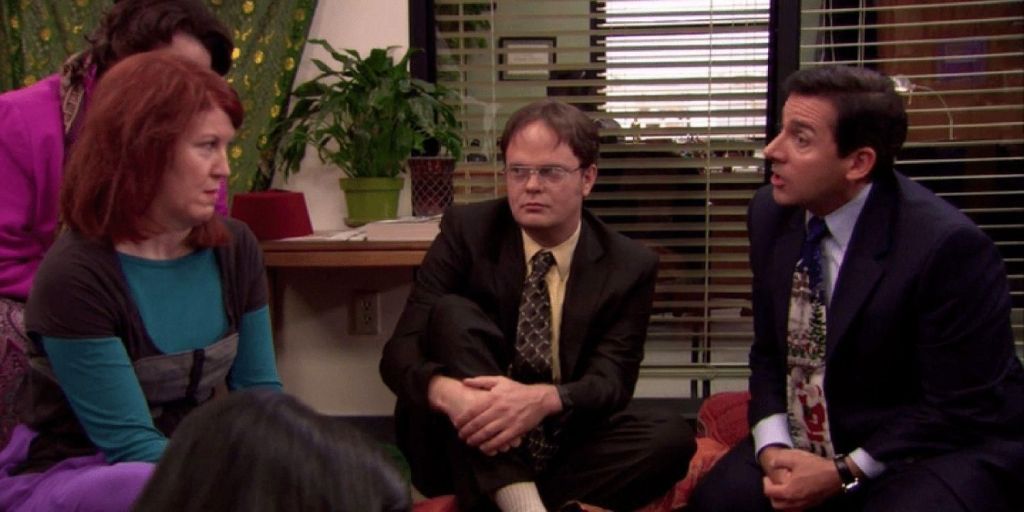
Meredith was always portrayed as the chaotic loose canon of The Office, andit’s on full show in this Christmas episode. Phyllis’ exotic Moroccan themed party quickly escalates from festive to full-blown intervention, when Meredith’s booze-fueled antics sets her own hair on fire. This leads to the rest of the team whispering about an intervention. When Toby half-heartedly tries to tell Michael he’s not legally allowed to, it’s done anyway. When Meredith refuses to go to rehab, Michael kidnaps her and takes her there by force.
While The Office is no stranger to awkward humor, “Moroccan Christmas” walks a fine line between comedy and cruelty. The entire scenario is played for laughs, but publicly ambushing an employee with suspected addiction struggles is deeply uncomfortable.
10) “Prince Family Paper” (Season 5, Episode 13)

“Is she hot? Are you kidding me? She’s a female Boris Becker.”
What starts as a relatively tame mission for Michael and Dwight to spy on a small family paper company, takes a sharp left turn into one of The Office’s most polarizing debates: Is Hilary Swank hot?
The B-plot of “Prince Family Paper” ignited controversy for more than just its absurdity. What could’ve been a throwaway gag instead devolves into a half-episode-long debate over Swank’s physical appearance, with every employee chiming in as if it’s a legitimate HR-sanctioned meeting.
The discomfort comes not just from the subject matter of judging a real-life celebrity’s looks in great detail within a sitcom, but the casual way it’s treated. It becomes an impassioned argument. Oscar brings out a projector, Pam references Million Dollar Baby, and Kevin chimes in with predictably crude opinions. In a world where women are already scrutinized to within an inch of their lives, especially celebrities, giving this even more screen time on a beloved TV show simply fuels the problem.
Years later, even diehard fans have trouble defending this one. It’s not just that the joke doesn’t land, it’s that it was never really a joke to begin with.








